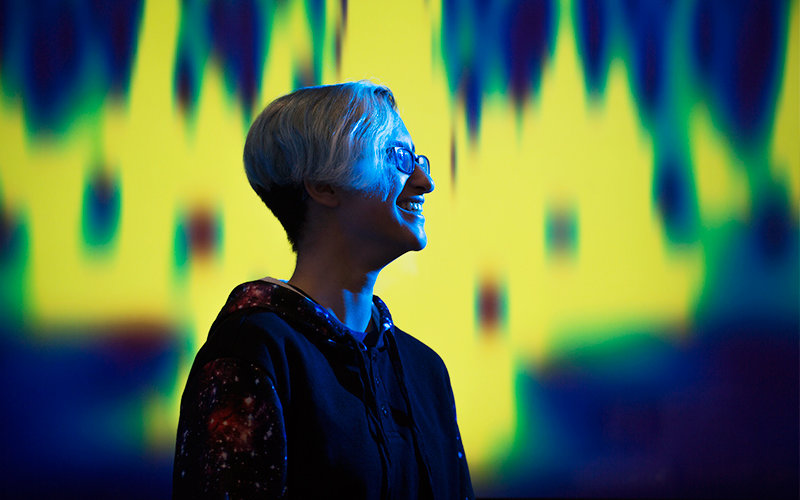
Physics major Isa Patane had no idea what it meant to be a gravitational-wave researcher a year ago. But after helping to launch a citizen science project at Cal State Fullerton to advance the search for gravitational waves, Patane is inspired by the work that promises to open an even bigger window into the mysteries of the universe.
“Working on this project has helped me connect with others working in gravitational-wave physics and opened up so many more possibilities than I ever thought I would have,” said the sophomore.
Patane and faculty mentor, Joshua Smith, associate professor of physics and Dan Black Director of Gravitational-Wave Physics and Astronomy, are part of an interdisciplinary team of gravitational-wave physicists and computer machine- learning scientists that developed the “Gravity Spy” citizen-science project.
The Gravity Spy team also involves physicists and machine-learning experts in engineering and computer science at Northwestern University, information and social scientists from Syracuse University, as well as members of “Zooniverse” — an online platform where the public can contribute to science projects — from Adler Planetarium in Chicago.
Through this National Science Foundation-funded effort, thousands of worldwide users, known as “gravity spies,” are helping the Advanced Laser Interferometer Gravitational-wave Observatory (LIGO) in its ongoing exploration of the universe to detect more gravitational waves. LIGO announced the first detection of gravitational waves on Feb. 11, 2016, following the discovery in September 2015, with the help of CSUF scientists — and a century after Einstein predicted their existence.
Smith is a co-author of a paper about the project published in Classical and Quantum Gravity. Read the full article here.
“The paper is an end-to-end description of the Gravity Spy project, including visualizing the LIGO data, using decisions made by both citizen-scientist volunteers and computer machine-learning algorithms to classify the data, and combining those decisions using methods from information science, as well as providing feedback to LIGO,” he said. “It is the one place to understand in detail all of the methods we use.”
Gravity Spy combines human intuition — citizen scientists — with the power of computers to process large amounts of data systematically. For this project, machine learning involves using computer programs to learn how to correctly categorize images by comparing them to similar categorizations done by humans, Smith explained. CSUF is expected to receive a total of $68,000 to support Patane and Smith’s role in the three-year project.
Their work involves focusing on classifying features in LIGO’s data to extend the distance to which LIGO can see gravitational waves, said Smith. The researchers comb through the data for instrumental and environmental sources of noises, called “glitches,” which can affect LIGO’s ability to detect cosmic gravitational waves.
“It is similar to removing the haystack to help find the needles,” said Smith. “This work will help to identify noise and artifacts in the data stream to separate out legitimate astrophysical events.”
To date, over 4,800 citizen scientist volunteers are involved with the project to discover new glitches, and in turn, their work will help LIGO scientists detect even more gravitational waves.
“The Gravity Spy project not only allows for research with other scientists, but with the public as well,” added Patane, a scholar in CSUF’s NSF-funded gravitational-wave research program.
The pair also engages with citizen scientists on the Zooniverse discussion forum, where they provide blog and social media updates about the project.
“I have been greatly impressed by the combined power of citizen scientists and machine learning to solve the massive and complex problem of classifying the hundreds of thousands of glitches in gravitational-wave data,” Smith said. “Identifying and removing sources of glitches is one of the best ways for us to extend our gravitational-wave view of the universe.”
To become a citizen scientist, visit Zooniverse.